Education AI Tools: Discover the Best Free Resources for Enhanced Learning
In the rapidly evolving world of education technology, various platforms are revolutionizing the way we learn and teach. From innovative learning management systems like Schoology to cutting-edge AI tools offered by Quizlet, these platforms are shaping the future of education. This blog delves into the features, pros, cons, and pricing of several key players in this field, including Schoology, Quizlet's AI Tools, Khanmigo by Khan Academy, CheggMate, Mathway, ClassDojo, Kahoot!, and Babbel. Each of these platforms brings something unique to the table, whether it's Schoology's interactive learning experiences, Quizlet's AI-enhanced study tools, Khanmigo's personalized tutoring, CheggMate's GPT-4 assisted learning, or Mathway's problem-solving capabilities. We'll explore how these platforms impact students, teachers, and administrators, and what makes each of them stand out in the crowded educational technology landscape.
1. Schoology
Schoology is an innovative learning platform that helps students, teachers, and administrators succeed in the classroom. It provides an easy-to-use, cloud-based platform with tools such as course creation, assignment management, collaboration tools, and assessments. Instructors can create engaging and interactive learning experiences, and students can access course materials, complete assignments, and collaborate in real-time. Administrators can track progress, monitor usage, and manage user accounts.
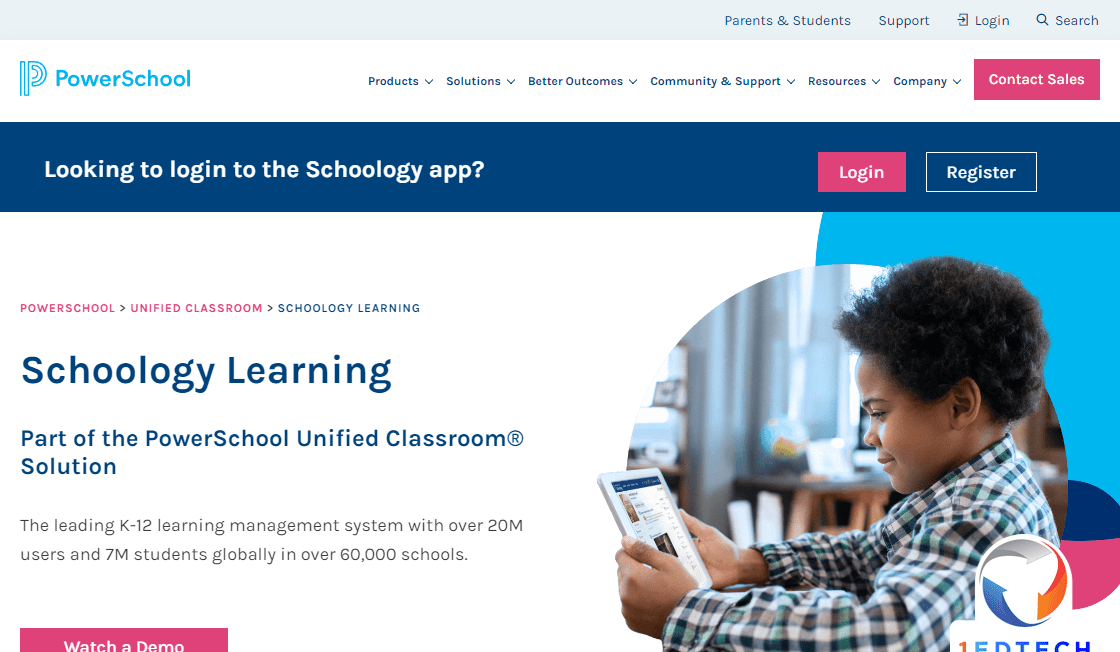
Pricing:
Contact for Pricing
Features:
Create engaging and interactive learning experiences
Access course materials and collaborate with classmates
Monitor usage and manage user accounts
Pros:
Project-Based Learning
Improved Student Engagement
Empowering Students with Technology
Allows teachers to upload Google docs, sheets, etc. as assignments
Allows integration with school's report card system
Allows different teachers to save and share materials
Cons:
Functionality lags at times
Dashboard needs improvement
System not intuitive, lacks customization
Frequent manual interventions required
No bank of frequently used comments for assignments
Issues with handling late submissions
No customization for the value of missing assignments
Inefficient bulk editing features
Mobile app is confusing and underutilized
2. Quizlet AI Tools
Quizlet's AI tools include Magic Notes, Memory Score, Quick Summary, Brain Beats, Q-Chat, and AI Enhanced Expert Solutions. These tools offer various functionalities such as creating flashcards from class notes, tracking memory scores, summarizing dense readings, turning flashcards into songs, personalized AI tutoring, and enhanced step-by-step expert solutions.
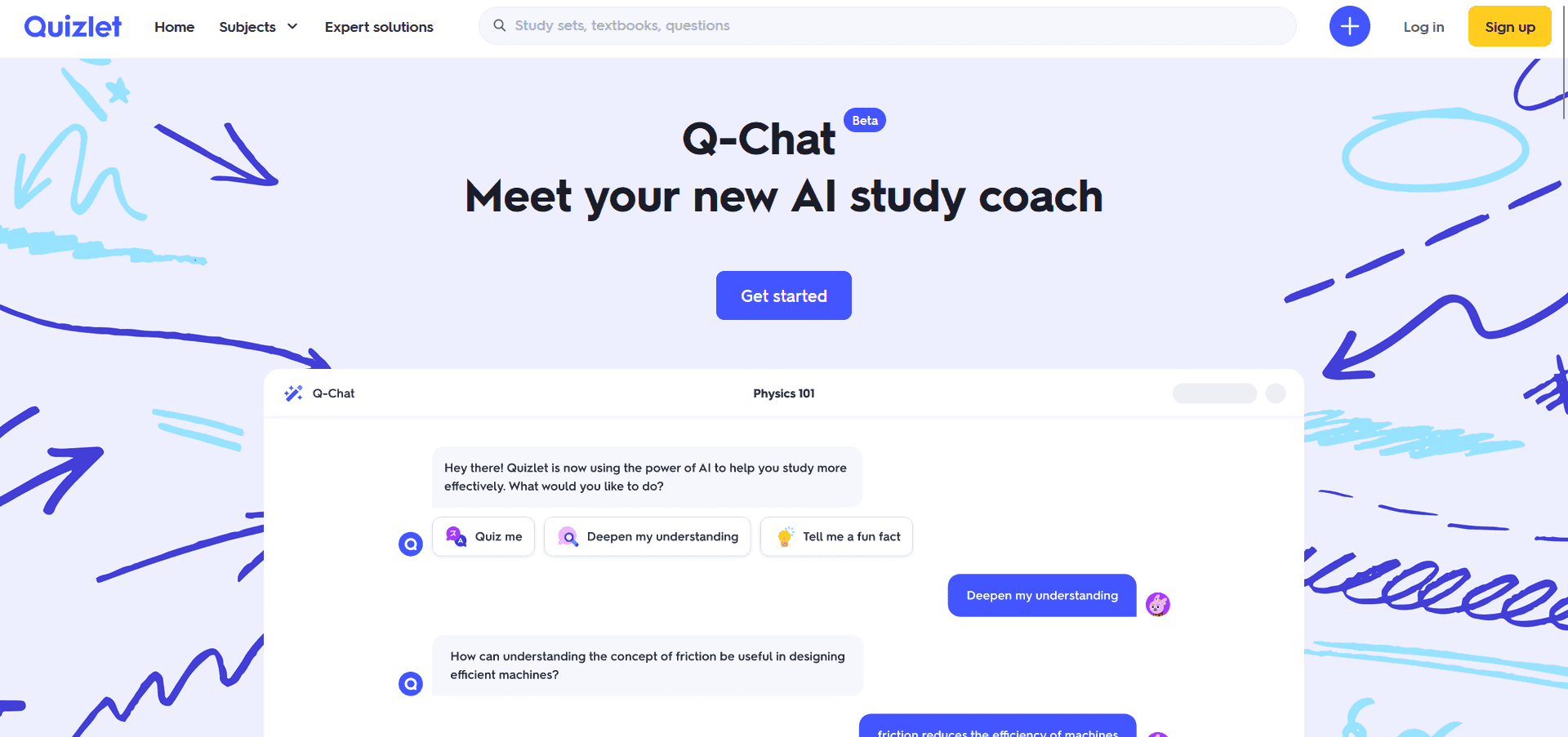
Pricing:
Free Plan
Quizlet Go: $1 per month
Quizlet Plus: $1.99 per month
Features:
Magic Notes
Memory Score
Quick Summary
Brain Beats
Q-Chat
AI Enhanced Expert Solutions
Pros:
Diverse study tools
Personalized tutoring
Efficient content summarization
Enhanced memorization methods
Cons:
Requires subscription for full access
Limited free features
3. Khanmigo
Khanmigo is an experimental AI guide from Khan Academy, aimed at mimicking one-on-one tutoring experiences by providing tailored support, prompting critical thinking, and suggesting relevant resources. It serves as a tutor, assistant, and coach for learners and educators, personalizing learning, offering real-time feedback, and enhancing creativity in subjects like math, reading, writing, and computer science.
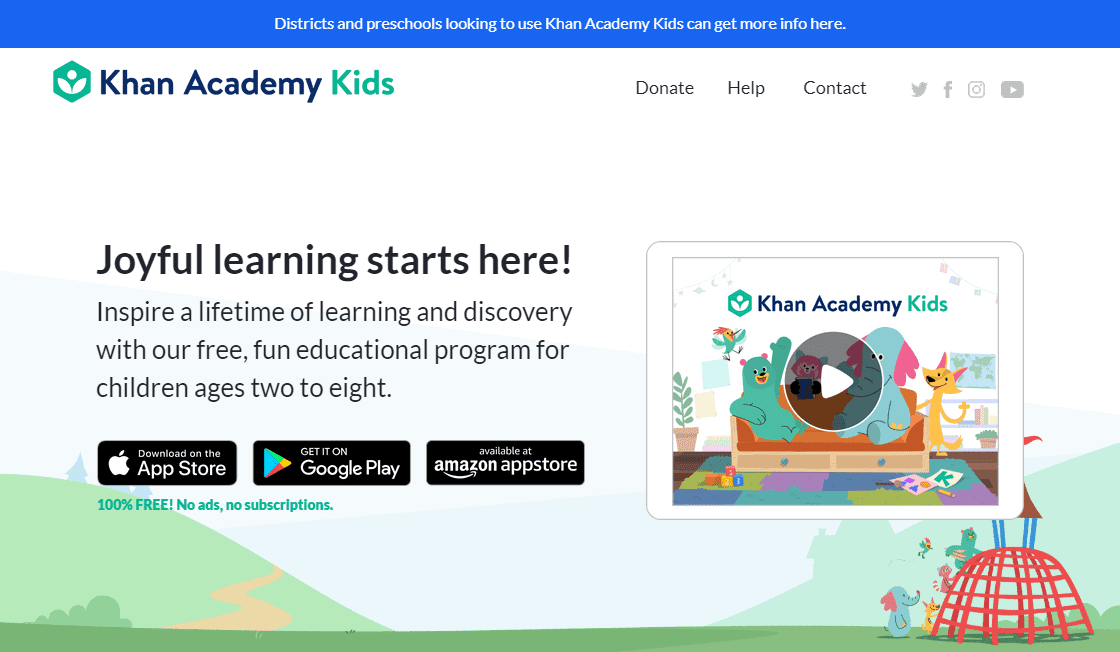
Pricing:
Freemium
$20/mo
Features:
Personalized learning experience
Real-time feedback
Supports various subjects including math, reading, writing, and computer science
Aids in lesson planning and student assessment
Pros:
Allows testing of new features shaping future learning
Provides personalized tutoring and feedback
Helps in learning new skills with prompts and suggestions
Supports Khan Academy's mission for free education
Cons:
Requires signing in and joining a waitlist
Mandatory $20 monthly donation for testing
Testing limited to users 18 or older in the US
Possible bugs or errors during testing as it's still in development
4. CheggMate
CheggMate is a new AI enhanced learning service developed by Chegg, Inc. It's built with OpenAI's GPT-4 and leverages Chegg’s extensive learning content and subject matter experts. CheggMate is designed to help students learn more effectively with improved outcomes. It offers personalized learning pathways, quizzes, tests, and context guidance. The tool supports various formats like written text, photos, math queries, or diagrams for student queries.
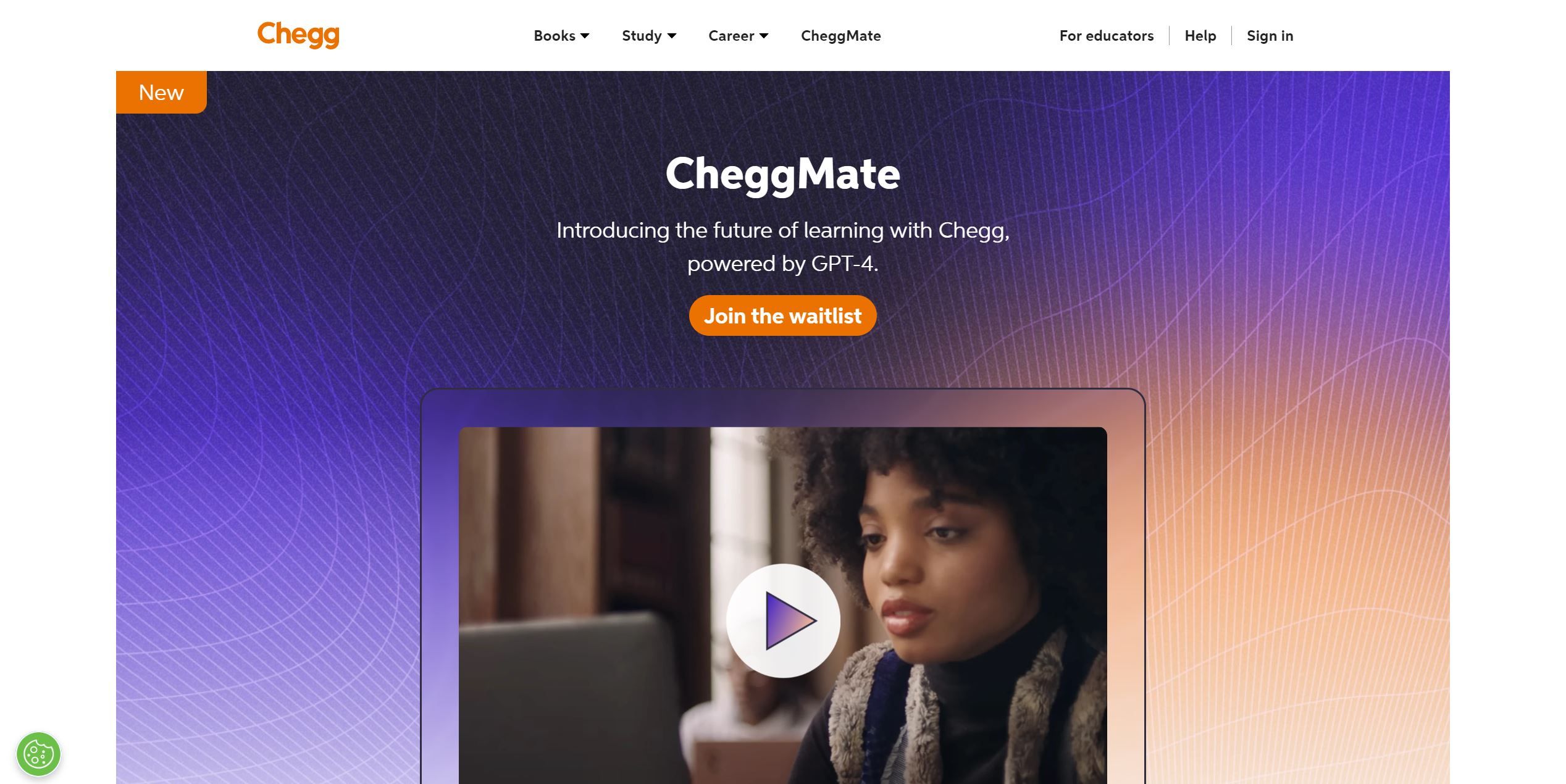
Pricing:
Free
Features:
Personalized learning pathways
Tailored quizzes and tests
Contextual guidance
Supports various query formats
Instant conversational AI support
Instant quizzes with knowledge gap recommendations
Content recommendations in different formats
Ability to resume learning anytime
Seamless integration of existing Chegg tools
Proprietary Library access
GPT-4 AI system
Subject Experts assistance
Instant AI-Powered Solutions
Personalized Learning adaptation
Adaptive Tutor
Instant Feedback
Pros:
Personalized study support
Adaptive learning
Expert Q&A access
Textbook solutions
Course-specific documents
Math solver
Citation tool
Plagiarism checker
Grammar checker
Proofreading feature
Personalized assessments/practice tests
Instant feedback
Leverages Chegg's library
Expert-backed content
Accelerates learning
Increases learning accuracy
Enhances learning effectiveness
Supports various education tasks
Career advice/tools accessibility
On-demand homework help
Exam prep support
Topic understanding support
Writing & citation support
Career development focus
Proprietary content resources library
Advanced problem-solving capabilities
Tailored learning paths
Continuous learning assistance
Real-time improvement suggestions
Cons:
Requires sign in
Limited to Chegg content
No offline functionality
Depends on subject experts
Limited personalization
Waitlist for access
Only English resources
Lacks multi-device sync
No user-content contribution
Potential privacy issues
5. Mathway
Mathway is a digital tool designed to assist students in understanding and solving math problems. It has a wide user base, having solved over 5 billion problems for students, parents, and teachers. Mathway's main goal is to provide on-demand math assistance and is committed to expanding its features and functionalities over time.

Pricing:
Subscription-based pricing, with potential changes subject to notice
Features:
Math problem solving in various fields like algebra, calculus, and more
Step-by-step problem explanations
Accessible to students, parents, and teachers
Pros:
Extensive problem-solving capabilities across various math disciplines
User-friendly interface
Helpful for educational purposes
Cons:
Subscription-based model might be a barrier for some users
Dependence on digital tools for problem-solving
6. ClassDojo
ClassDojo is a communication app for the classroom. It connects teachers, families, and students to build amazing classroom communities. It offers features like messaging, sharing stories, updates, and events, supporting social-emotional learning, and a teacher toolkit.
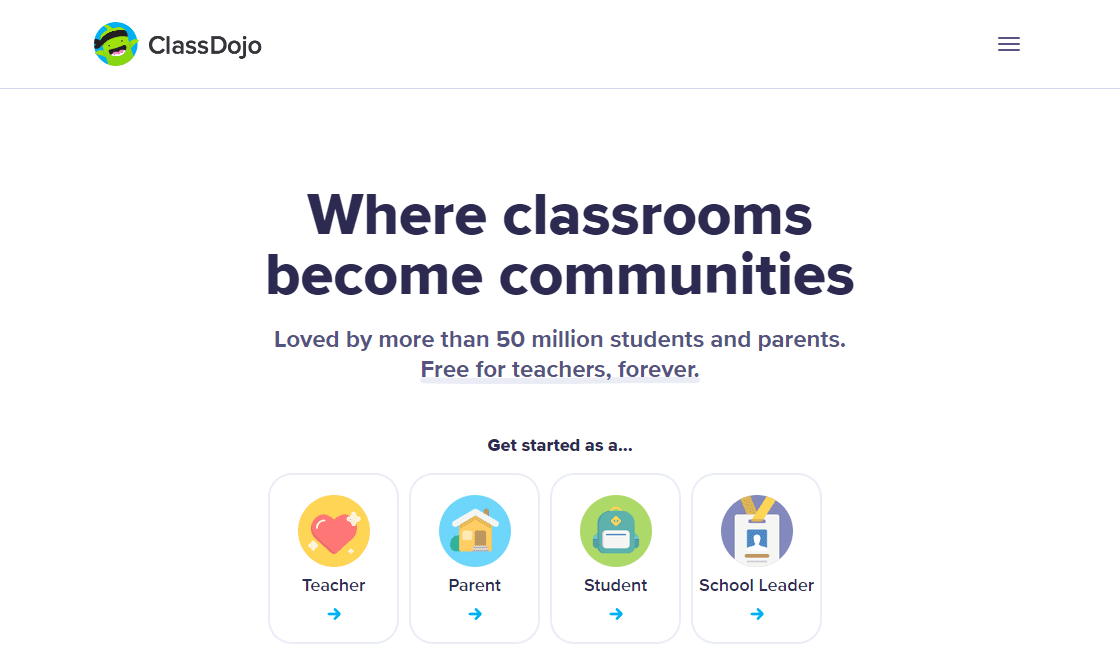
Pricing:
Free for teachers
Features:
Messaging in over 35 languages
Private feed for sharing photos, videos, and updates
Event calendar with automatic reminders
Support for social-emotional learning
Student portfolios
Teacher toolkit with various classroom tools
Pros:
Enhances communication between teachers, families, and students
Supports a variety of languages for messaging
Facilitates social-emotional learning
Free for teachers
Cons:
Limited information on advanced features without further research
May require training for optimal use
7. Kahoot!
Kahoot! is a game-based learning platform that allows users to create, share, and play learning games or trivia quizzes. It is widely used in educational and corporate settings for team bonding, training, and learning enhancement.
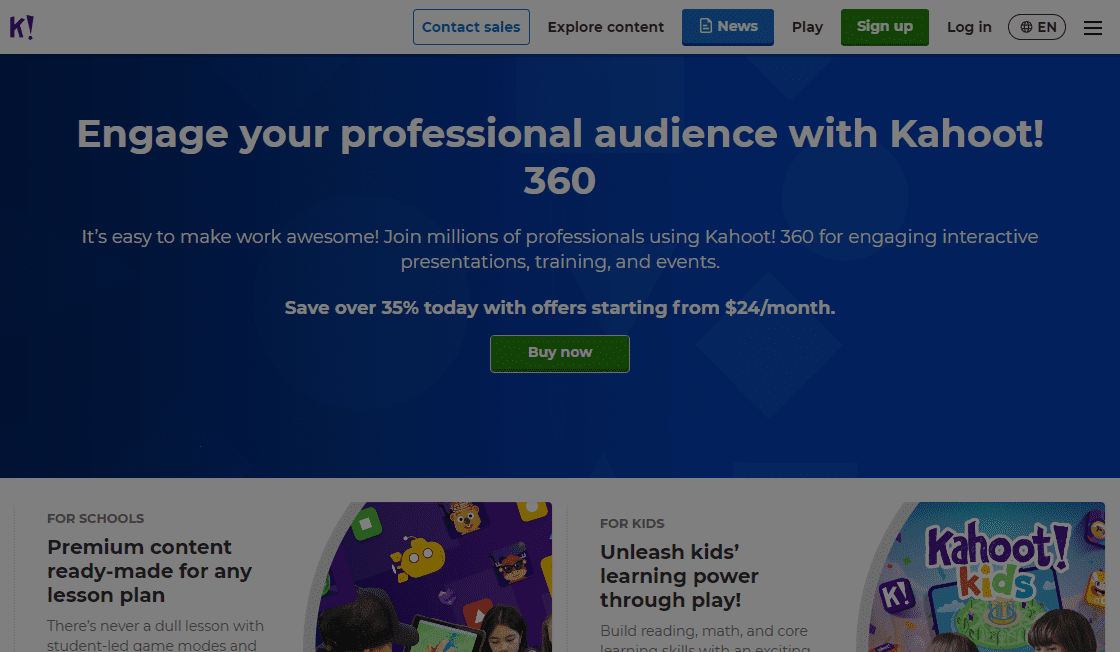
Pricing:
Kahoot! 360 Presenter: $24 per host per month ($285.50 billed annually)
Kahoot! 360 Pro: $49 per host per month ($588 billed annually)
Kahoot! 360 Pro Max: $69 per host per month ($828 billed annually)
Features:
Interactive quiz creation
Game-based learning platform
User-friendly interface
Customizable content
Integration with Microsoft Azure OpenAI for AI-powered features
Pros:
Engaging and fun for learning and team activities
Easy to create content for various learning levels
Good for interactive presentations and quizzes
Customizable and user-friendly interface
Cons:
Integration with other products can be tricky
Requires good internet quality for optimal operation
8. Babbel
Babbel is an innovative language-learning platform designed for learners of all levels to master a new language quickly and easily. It offers interactive lessons, audio clips, and quizzes, providing an immersive experience. Babbel covers various languages, with lessons designed by experienced teachers. It provides feedback on pronunciation and allows progress tracking. Custom lessons tailored to individual needs are also available.
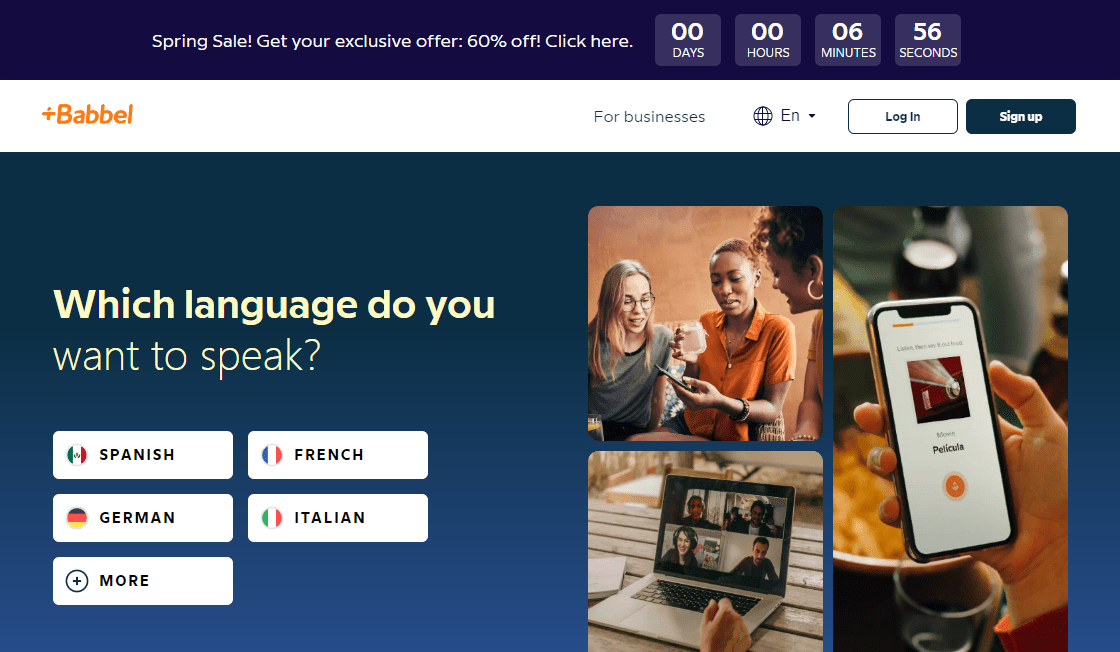
Pricing:
1-month Plan = $15
3-month Plan = $38
6-month Plan = $63
12-month Plan = $180
Lifetime Subscription = $200-$300
Features:
Learn basic vocabulary with interactive lessons
Practice pronunciation with audio clips and feedback
Create custom lessons tailored to individual needs
Pros:
Offers courses related to 14 languages
Provides live virtual classes
Offers podcasts to learn new vocabulary
Certified language teacher for all classes
Suitable for listening, speaking, and reading skills
Suitable for business
20-day money-back guarantee
Lifetime plan provides access to all languages
Offers 2-Minute Stories for practice
Easy-to-use and attractive design
Cons:
Content quality varies between languages
Live classes available for limited languages
Summary:
This comprehensive overview of leading educational technology platforms highlights the innovative ways in which learning is being transformed. From Schoology's cloud-based classroom management to Quizlet's AI-powered study tools, Khanmigo's experimental AI guide, CheggMate's personalized learning pathways, Mathway's mathematical problem-solving, ClassDojo's classroom communication, Kahoot!'s game-based learning, and Babbel's language lessons, each platform offers unique features and solutions. While they all aim to enhance the educational experience, they also come with their own set of challenges. Understanding the pros and cons of each can help educators, students, and administrators make informed decisions about integrating technology into their learning environments. This analysis underscores the importance of technology in modern education, offering insights into the future of learning and the ongoing pursuit of educational excellence.